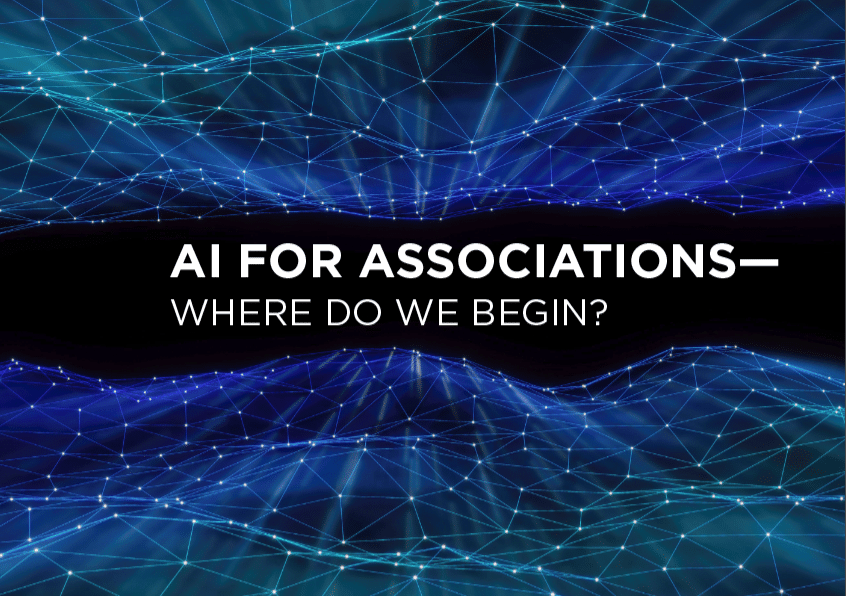AI For Associations: Where Do We Begin?

“AI is one of the most important things humanity is working on. It is more profound than, I dunno, electricity or fire.”
-Google CEO Sindar Pichai, speaking at a town hall event in San Francisco in January 2018
The buzz surrounding AI is everywhere.
Three years ago, I did a presentation called “AI as a Tool to Improve Operations and Advance Association Missions“ at Association Forum’s SmartTech virtual conference, and here we are again trying to make sense of where we can leverage this game-changing technology.
ALERT: The following section of this article was written entirely by ChatGPT (an AI chatbot):
Artificial intelligence (AI) has been in use for several years and has made significant contributions to various fields, including healthcare, finance, transportation, and many others.
Here are some AI technologies that have been in use for years:
- Machine Learning (ML): Machine learning is an AI technology that allows computer systems to automatically learn and improve from experience without being explicitly programmed. It has been used in various applications such as fraud detection, recommendation systems, and image and speech recognition.
- Natural Language Processing (NLP): NLP is a branch of AI that enables computers to understand, interpret, and generate human language. It has been used in applications such as chatbots, virtual assistants, and sentiment analysis.
- Computer Vision (CV): Computer vision is an AI technology that allows computers to interpret and analyze visual information from the world. It has been used in applications such as object recognition, facial recognition, and image classification.
- Robotics: Robotics is a field of AI that deals with the design, construction, and operation of robots. It has been used in various industries such as manufacturing, healthcare, and agriculture.
- Expert Systems: Expert systems are AI technologies that emulate the decision-making abilities of a human expert in a particular domain. They have been used in applications such as medical diagnosis, financial analysis, and quality control.
- Neural Networks: Neural networks are a type of AI technology that mimics the functioning of the human brain to learn and improve. They have been used in various applications such as image and speech recognition, natural language processing, and game playing.
These are just a few examples of AI technologies that have been in use for years. With the rapid pace of technological advancements, it’s likely that we will see even more AI technologies emerge and become commonplace in the years to come.
ALERT: Now back to a human doing the writing!
The point of sharing the above copy is to highlight that we all enjoy the benefits of convenience and personalization made possible by AI on a daily basis:
- YouTube suggests videos.
- Gmail finishes your sentences.
- Facebook targets you with ads.
- Spotify learns the music you love.
- Alexa and Siri answer your questions.
- Amazon predicts your next purchases.
- Netflix recommends shows and movies.
- Google Maps routes you to your destination.
- Apple unlocks the iPhone by scanning your face.
- Tesla Autopilot steers, accelerates, and brakes your car.
- Zoom automatically transcribes your recorded meetings.
So, how can we leverage the power of AI in association management?
Well, from a transformation perspective, AI can be used to drive efficiency, grow revenue, and increase reserves for an association.
The best way to get started with AI is by doing quick-win pilot projects with narrowly defined use cases or problems to solve and high probabilities of success. There are two natural categories of association management to consider for putting together your own use case. The elements to look for in these cases include data driven tasks, repetition, or things that are making a prediction. The value is usually either an Efficiency Lift (time or money saved) or a Performance Lift (increased probability of achieving business goals).
Think about the work in your area of association management and what the day-to-day tasks are. Are they data-driven? Are they repetitive? Do they make a prediction? Or is there a problem to solve that could be done with an AI tool?
Create a chart to evaluate each case and research any AI tools out there that could be used. This will provide some concrete steps in using AI in your association TODAY.
So, consider each use case and think about the potential time and money saved, as well as the increased probability of achieving your association’s business goals. Rank each use case on a scale of 1-5.
1 = No value
2 = Minimal value
3 = Moderate value
4 = High value
5 = Transformative
Once you’ve identified some use cases and possible AI tools, you will be well on your way to testing the true power of AI in association management. Good luck!
Tags
Related Articles
Protecting Healthcare: Tackling Cyber Threats to Hospitals and Patients
The critical role of cybersecurity in healthcare and association management.
Double Your Footprint: Enhancing Conferences with a Hybrid Event Workflow
By combining on-site engagement with a digital experience, hybrid events can attract diverse audiences, boost...
You’ve Been Running GA4, What Now?
The Google Analytics 4 (GA4) conversion deadline last summer brought chaos to our marketing team…





